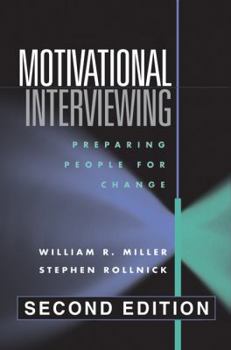Motivational Interviewing, Second Edition: Preparing People for Change
(Part of the Applications of Motivational Interviewing Series)
Select Format
Select Condition 
Book Overview
In this text, the authors explain how to work through ambivalence to facilitate change, present detailed guidelines for using their approach, and reflect on the process of learning MI. This description may be from another edition of this product.
Format:Hardcover
Language:English
ISBN:1572305630
ISBN13:9781572305632
Release Date:April 2002
Publisher:Guilford Publications
Length:428 Pages
Weight:1.71 lbs.
Dimensions:1.3" x 6.5" x 9.7"
Customer Reviews
5 ratings
Motivational Interviewing
Published by Thriftbooks.com User , 17 years ago
What a wonderful book. I recently completed an introductory course in Motivational Interviewing and found the book an invaluable companion. My primary theoretical orientation is Reality Therapy but have found Motivaitonal Interviewing to be an easily integrated set of techniques for virtually any counseling style. Most importantly, MI appears to offer a set of techniques that fit well with the limitations often placed on counselors by managed care. I have found through personal experience that once people are motivated to change, progress is relativly fast. It's getting them ready that often presents the challenge; this book meets that challenge head on.
Motivational Interviewing
Published by Thriftbooks.com User , 17 years ago
This is a good book to read and keep. The chapters are easy to read because they are not too long. The information is easy to grasp, apply and retain. I definitely recommend this book.
Very helpful instructional manual
Published by Thriftbooks.com User , 18 years ago
I love this book. The second edition is a big improvement over the first as it makes the MI approach more generic (as it should be) and less tied specifically to substance abuse. I regularly use this book when teaching beginning therapy skills to doctoral students in clinical psychology, but it's not just a book for beginners. What I like is the way Miller & Rollnick spend a lot of time talking about generic skills fundamental to any healthy therapeutic relationship -- and especially their discussions about different types of reflective listening and dealing with resistance. The MI approach is especially helpful in dealing with clients who are struggling with ambivalence about their problems (or about being in therapy) -- which happens with great frequency in any practice (not just with substance abusers or court-ordered clients). I wish I had had this book 30 years ago when I was starting out as a therapist. I love teaching from it because I can still pick out gems even now. MI fits well with all sorts of other psychotherapy techniques, including client-centered, cognitive-behavioral, and strategic/structural.
Kudos for Miller and Rollnick
Published by Thriftbooks.com User , 19 years ago
As a longtime clinician and trainer of clinicians, I found Miller and Rollnick's "Motivational Interviewing" (2d edition) extremely sound, helpful and thoughtful. A great book for clinicians to read who are tempted to push one side of a patient's ambivalence ("But can't you see you have to leave him -- he's no good for you!")and not to respect the other side of it.
An Essential Guide to Exploring and Resolving Ambivalence
Published by Thriftbooks.com User , 21 years ago
When do you use a Motivational Interviewing approach? Whenever there is ambivalence for change. How often does ambivalence for change occur? At almost any time people are considering some kind of change. In this 2nd edition of Motivational Interviewing, the authors are very clear that MI is not an approach that obviates the use of other therapy approaches, such as CBT, but is an approach that prepares people for change.I have been a trainer in Motivational Interviewing since 1995 (see http://www.cathycoletraining.com) and am privileged to have received my training from the authors, Drs. Miller and Rollnick. The first edition, Motivational Interviewing, Preparing People to Change Addictive Behavior, provided information that has helped many professionals working in addictions a way to more effectively engage clients in the process of change. The 2nd edition is written so that professionals working with clients around any issues...mental health, health behavior, addictions, health promotion, life coaching...are able to apply the methods for exploring and resolving ambivalence for change.The first three chapters of the book set the stage for understanding the nature of change and ambivalence for change so that the reader is more fully prepared to understand the value of fully understanding the client situation and eliciting desire, ability, reasons, need and committment for change from the client. This approach differs from the often tendency to understand the client's situation and then in a well meaning way, prescribe the needed steps for change. The strategies for interacting with clients via the use of open ended questions and the use of reflective responses is clearly discussed. Methods for eliciting change talk and responding to the concept of resistance are easily understood and examples are provided that will assist readers in considering how this approach will fit into their unique situations.Of great value to me has been the expanded view of the concept of client resistance. From the MI approach, resistance is seen as occuring in context and is conceived of as dissonance...just a lack of harmony, or being on the same page together. When viewed in this way, it just signals the professional that another approach is needed. How to 'roll with resistance' is then illustrated very clearly.This edition of Motivational Interviewing has expanded my ability to provide training. Even more importantly, the emphasis of this edition has underscored even more for me,that in my provision of psychotherapy, MI is not an approach to be pulled out for special occasions but is the treatment philosophy from which I approach all clients, despite the particular therapy modality utilized in the specific work.






